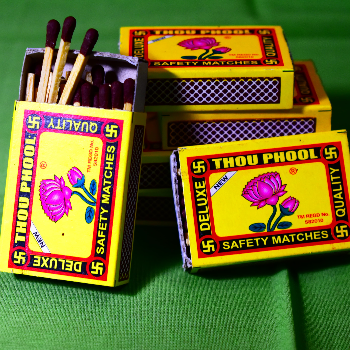In the heart of Tamil Nadu, nestled between lush green fields and swaying palm trees, lies the bustling village of Sivakasi. Known as the "Little Japan" of India, this vibrant community is renowned for its thriving cottage industry, particularly in the production of matchboxes. For decades, matchboxes have not only illuminated homes but have also kindled economic growth and empowerment in rural India.
Meet Rajeshwari, a 35-year-old mother of three. Like many women in Sivakasi, she is the backbone of her household. Her days are spent meticulously assembling matchboxes, a skill passed down through generations. For Rajeshwari, this humble craft is more than just a job; it's a lifeline. It offers her the financial independence and stability she needs to support her family.
The major distinct problem faced by women like Rajeshwari in rural India is the lack of consistent and reliable income opportunities. The traditional roles and economic structures often limit their ability to contribute financially to their households. This is where the simple yet powerful matchbox comes into play.
Producing matchboxes provides a steady source of income for thousands of families in and around Sivakasi. The work is labor-intensive yet offers flexible hours, allowing women to balance their domestic responsibilities while contributing financially. This flexibility is crucial in a society where women are expected to manage household chores and childcare.
The economic impact of matchbox production extends beyond individual households. It breathes life into the local economy by creating jobs, stimulating entrepreneurship, and fostering a sense of community. Small-scale matchbox manufacturers collaborate with local suppliers for raw materials, ensuring that the economic benefits are shared across the community.
Take the case of Kumar, a local entrepreneur who started his own matchbox manufacturing unit. With a small loan, he set up a modest factory and employed 50 workers from the village. Today, Kumar's business not only supports his family but also provides livelihoods for many others. His story is a testament to the transformative power of this industry.
Moreover, matchboxes have become a symbol of empowerment for women like Rajeshwari. They take pride in their work, knowing that each box they assemble contributes to their children's education, healthcare, and overall well-being. The sense of purpose and achievement derived from this work is invaluable.
From a practical perspective, matchboxes are an essential commodity in households across India. They are used daily for cooking, lighting lamps, and performing religious rituals. Their affordability and accessibility make them an indispensable part of everyday life in rural communities.
But the impact of matchboxes goes beyond the practical. They represent hope, resilience, and self-sufficiency. They empower women to break free from traditional economic constraints and carve out their own paths to financial independence.
As the demand for matchboxes continues to grow, so does the opportunity for economic empowerment in rural India. For women like Rajeshwari, the simple act of assembling matchboxes is a gateway to a brighter future. It allows them to contribute to the economic fabric of their community while ensuring a better quality of life for their families.
In conclusion, the story of matchboxes in rural India is one of transformation and empowerment. They are not just tools for igniting fires; they are catalysts for change. By supporting this industry, we can help light the way to a more prosperous and equitable future for communities across India.
Visit Vyaparify Site:
https://id.vyaparify.com/sri-kamatchiammal-match-works 
